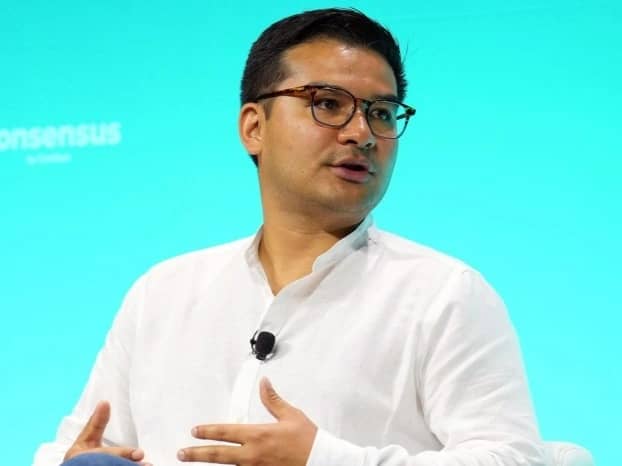위키 구독하기
Share wiki
Bookmark
Asher Genoot
0%
Asher Genoot
**애셔 제누트(Asher Genoot)**는 에너지 및 디지털 인프라 분야에서 활동하는 미국 비즈니스 임원이자 기업가입니다. 그는 Hut 8의 최고 경영자(CEO)이며 American Bitcoin의 이사회 멤버입니다. 제누트는 이전에 US Bitcoin Corp를 공동 설립했으며 2024년 Forbes 30 Under 30 북미 에너지 부문 목록에 이름을 올렸습니다. [1]
교육
제누트는 서던 캘리포니아 대학교(University of Southern California)에서 경영학 학사 학위를 받았습니다. 그는 또한 대학의 에너지 전환 이니셔티브 비즈니스 자문위원으로 활동하며 진화하는 에너지 환경에 초점을 맞춘 프로그램에 기여하고 있습니다. [2]
경력
제누트는 2015년 상하이에서 Ivy Crest Institute of International Education을 설립하면서 기업가 경력을 시작했습니다. 이듬해 그는 교육 기술 회사인 Curio Education을 설립하여 2019년까지 최고 경영자로 재직했습니다. 그는 2023년까지 Curio Education의 이사회 멤버로 활동했습니다. 미국으로 돌아온 후 2019년 로스앤젤레스에서 Flagship Endeavors를 설립하여 2022년까지 관리 이사로 활동했습니다.
2020년 말, 제누트는 US Bitcoin Corp(USBTC)를 공동 설립하여 디지털 자산 산업으로 전환했습니다. 그는 처음에는 최고 운영 책임자(COO)를 맡아 회사의 운영 성장을 감독했으며, 2022년에는 사장으로 승진했습니다. 재임 기간 동안 그는 그해의 변동성이 큰 암호화폐 시장 상황을 헤쳐나갔습니다. USBTC와 Hut 8의 합병 후 제누트는 2023년 말 새로 합병된 법인의 사장으로 임명되었습니다. 그는 이후 2024년 초에 최고 경영자로 승진하여 디지털 인프라 개발에 대한 "에너지 우선" 접근 방식에 회사의 초점을 맞추는 임무를 맡았습니다. 2025년에는 American Bitcoin의 이사회에도 합류했습니다. 제누트는 Young Presidents' Organization(YPO)의 멤버입니다. [2]
인터뷰
American Bitcoin
2025년 9월 블룸버그와의 인터뷰에서 에릭 트럼프와 제누트는 American Bitcoin의 거래 데뷔에 대해 논의하며 암호화폐 채굴 부문에서 American Bitcoin의 역할을 설명했습니다. 트럼프는 회사가 대규모 인프라와 Hut 8과의 파트너십을 통해 시장 가격의 약 절반 가격으로 비트코인을 채굴할 수 있는 능력을 강조했습니다. Hut 8은 채굴 장비를 공급하고 벤처에 주요 지분을 보유하고 있습니다. 트럼프와 제누트는 모두 비트코인 축적 및 에너지 비용 관리에 대한 회사의 전략에 대해 이야기하는 동시에 업계가 직면한 과제를 되돌아봤습니다. 트럼프는 회사에 대한 개인적인 지분을 언급하고 정치적 영향력에 대한 질문에 답했습니다. 동시에 제누트는 더 넓은 암호화폐 환경 내에서 American Bitcoin의 운영 및 전략적 방향에 대한 자신의 관점을 추가했습니다. [3]
노변담화
2025년 9월 비트코인 컨퍼런스에서 제누트와 아이린 가오(BITMAIN) 간의 노변담화에서 채굴 기술, 특히 U3 채굴기와 인프라 솔루션의 최신 발전에 대한 통찰력이 공유되었습니다. 그들은 비트코인 채굴 기계 분야에서 Bitmain의 리더십과 Hut 8의 최근 개발, 특히 전 세계적으로 단일 건물에서 가장 높은 해시율을 자랑하는 것으로 알려진 텍사스에 새로운 데이터 센터 건설에 대해 논의했습니다. 대화는 ASIC 칩과 AI 데이터 센터를 통합하고 상당한 에너지 절감을 달성한 효율적인 설계에서 두 회사 간의 협력에 대해 다루었습니다. 그들은 이 45억 달러 규모의 프로젝트가 1년 이내에 어떻게 결실을 맺었는지 회상하며 채굴 부문에서 파트너십과 혁신의 중요성을 강조했습니다. 이 강연은 또한 채굴 운영의 비용 효율성과 기술 통합을 향상시키는 것을 목표로 하는 미국 제조 및 향후 프로젝트에 대한 계획을 강조하여 궁극적으로 Hut 8을 업계의 주요 업체로 자리매김했습니다. [5]
비트코인, 채굴 및 트럼프
2025년 9월 Crypto In America 팟캐스트에서 제누트는 에릭과 도널드 트럼프 주니어의 지원을 받아 4월에 시작한 American Bitcoin을 포함한 그의 벤처에 대해 논의했습니다. 그는 비트코인 채굴 산업에서의 경험을 설명하면서 미국이 글로벌 금융 시스템을 형성하는 데 중추적인 역할을 한다고 강조했습니다. 제누트는 회사가 "디뱅킹"되었을 때 직면한 어려움을 회상하며 암호화폐가 촉진하는 금융 독립의 중요성을 강조했습니다. 그는 규제 환경의 진화와 초기 어려움에서 채굴 부문의 핵심 플레이어가 되기까지의 성장을 설명했습니다. 제누트는 또한 암호화폐 및 인프라에 대한 상호 관심사를 통해 발전한 트럼프 가족과의 협력에 대한 통찰력을 공유하여 미국에서 강력한 비트코인 채굴 인프라를 구축하는 데 초점을 맞춘 생산적인 파트너십으로 이어졌습니다. [4]
AI 경쟁에서 승리하기
2025년 4월 Failing Up 팟캐스트 에피소드에서 제누트는 에너지 부문으로 전환하기 전에 에드테크 스타트업으로 시작한 다양한 경력 여정에서 얻은 통찰력을 공유했습니다. 그는 금융 인턴십 동안 불만을 경험한 후 단순한 재정적 성공보다 의미 있는 업무를 우선시하게 된 동기에 대해 논의했습니다. 이러한 성찰은 그가 글로벌 리더로부터 배우고 교육을 통해 청소년에게 권한을 부여하는 기회를 추구하도록 이끌었습니다. 결국 미국으로 돌아온 후 제누트는 에너지와 비트코인 채굴에 초점을 맞추어 진화하는 환경에서 운영 우수성과 지속 가능한 에너지 소비의 중요성을 강조했습니다. 그는 2022년 암호화폐 시장의 침체기 동안 상당한 어려움을 헤쳐나가면서 팀과 투자자 모두에게 회복력과 투명성을 보여주었습니다. 제누트는 리더십에서 명확한 의사 소통과 성실성의 필요성을 강조하면서 혁신적인 인프라 솔루션을 통해 에너지 부문에 오래 지속되는 영향을 미치기 위해 노력했습니다. [6]
패널
해시 전쟁
2025년 5월 Mining Disrupt에서 열린 "해시 전쟁: 중앙 집중식 대 분산식 채굴"이라는 제목의 패널 토론에서 업계 전문가들은 비트코인 채굴의 미래와 중앙 집중식 및 분산식 채굴 전략 간의 지속적인 경쟁에 대해 토론했습니다. 패널에는 제누트, 안킷 조시, 스콧 존슨, 졸리 칸, 비트코인 메카닉, 벤 스미스, 오거스틴 크루프카, 브라이스 맥날리가 포함되었습니다. 패널리스트들은 두 채굴 접근 방식의 장단점에 대한 관점을 공유했습니다. 중앙 집중식 채굴은 규모의 경제와 인프라 기능으로 인해 주목을 받았지만 참가자들은 네트워크 복원력과 보안을 강화하기 위한 분산화에 대한 인식이 높아지고 추진력이 커지고 있음을 강조했습니다. 패널리스트 간의 합의는 업계가 진화함에 따라 중앙 집중식 효율성과 분산식 제어 간의 균형이 성장을 유지하고 비트코인의 기본 원칙을 유지하는 데 필요할 수 있음을 시사했습니다. [7]
잘못된 내용이 있나요?
